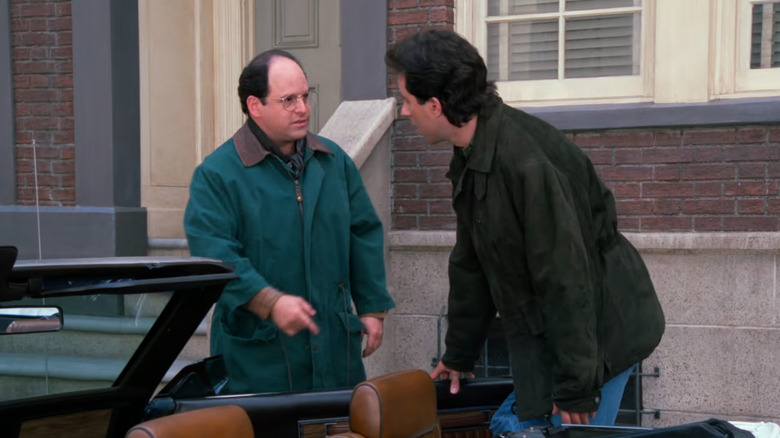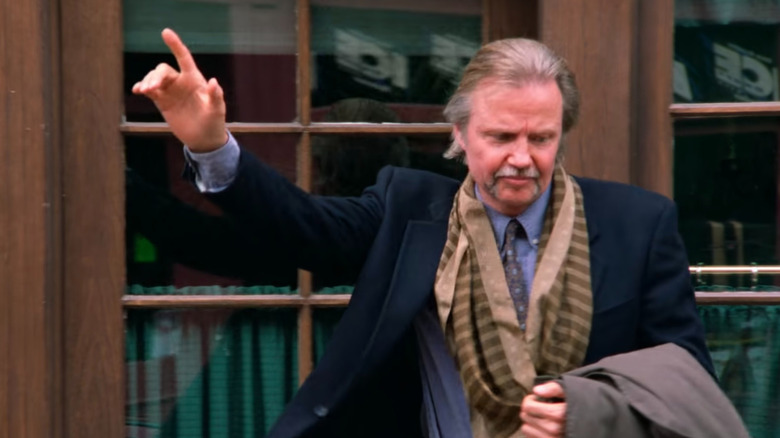A Real Argument Between Seinfeld Writers Inspired This Episode's Conflict
Sitcoms have endured as a television staple because there's an inherent relatability embedded within their DNA. What would otherwise be a pretty stressful predicament in reality is given a sense of levity through a character ensemble we follow from week to week. Not every sitcom is made in one another's image, however, as familial dynamics, locations, and even the period in which they're made impart a greater context upon their stories. Shows like "I Love Lucy," "The Jeffersons," and "The Office" are considered some of the greatest sitcoms ever made, but they couldn't be more different from one another. Over the decades, these comedies have grown beyond characters learning life lessons and led to the central dilemmas becoming increasingly weirder, and we partially have "Seinfeld" to thank for that.
The hit NBC series from co-creators Larry David and Jerry Seinfeld was pitched to the network as an anti-sitcom about how comedians get their material. "Seinfeld" lived up to its mantra across its impressively successful nine season run, with its titular character ending up in bizarre circumstances that often provide great fodder for his stand-up routines, as well as his in-universe television pilot script. As the show got more and more popular with each season, "Seinfeld" also broadened its joke horizons through hilariously specific stories like "The Mom and Pop Store."
The season 6 episode opens with George (Jason Alexander) becoming the owner of an '89 LeBaron after a used car salesman tells him that it used to belong to none other than actor Jon Voight. Naturally, he loves the notoriety of possessing a vehicle that was previously driven around by a famous celebrity (at the time), while Jerry (Seinfeld) just as naturally thinks he's being a clown. Even when the registration says John Voight, George keeps digging his heels in. Eventually, Kramer (Michael Richards) gets in on the action, with the two following any and all potential clues to fit their narrative of where the LeBaron came from. It's hilarious to see how such a small thing — in typical "Seinfeld" fashion — keeps escalating to such absurd degrees. And as it turns out, the genesis of "The Mom and Pop Store" actually came from a real-life experience between two of the show's writers.
Writer Tom Gammill thought he'd actually bought Jon Voight's car
In the audio commentary for "The Mom and Pop Store," writer Tom Gammill talks about how the subplot came about because he initially believed that he bought a car that used to belong to Voight. He was so adamant that it led to a skeptical disagreement between him and his writing partner Max Pross. Hearing your friends say they own something that formerly belonged to a celebrity sounds like the kind of thing you want to believe, but without much evidence to back it up, it just sounds ridiculous. Seinfeld saw the value in their disagreement and encouraged them to write an episode around it. The subplot ends with disappointment on George's end, with the infamously creepy dentist Dr. Tim Whatley (Bryan Cranston) revealing his car actually belonged to a periodontist friend he went to medical school with named John Voight. But while the episode leads to a non-conclusion, the real story ends in the best way it possibly could.
By some miracle, "Seinfeld" was able to book Voight for under an hour to shoot his cameo. It's really funny how it plays out, too. A bleeding Kramer spots him hailing a taxi, yells his name, sticks his hand in his ride, and proceeds to get bitten by the then-future star of "Anaconda." The teeth indentations on his friend are what lead George to believe the bite marks on a glove compartment pencil could match, which itself partially inspired the actual argument. Despite only being on the set for a brief time, Voight was also able to settle the dispute between Gammill and Pross, only to disappoint the former by revealing that he never owned that particular vehicle.
Of all the outcomes to have, getting to meet the person on the set of the episode you co-wrote about them is the best way it could have gone. "The Mom and Pop Store" even concludes with a laugh track-free tribute to the heartbreaking ending of Best Picture-winner "Midnight Cowboy," with Jerry and Kramer doing a riff on Voight and Dustin Hoffman's characters, respectively, aboard a bus.
Every episode of "Seinfeld" is currently streaming on Netflix.

